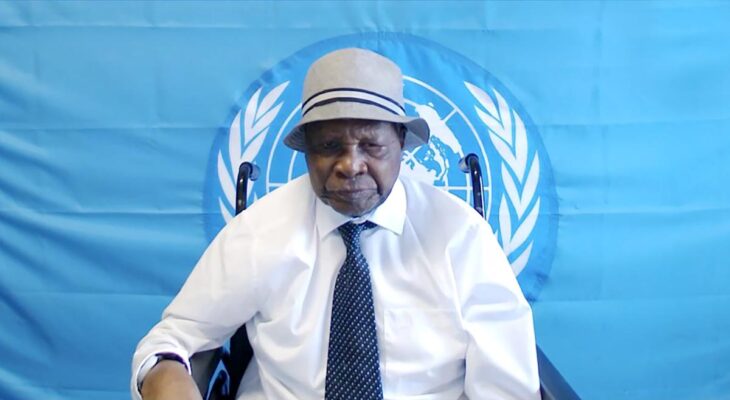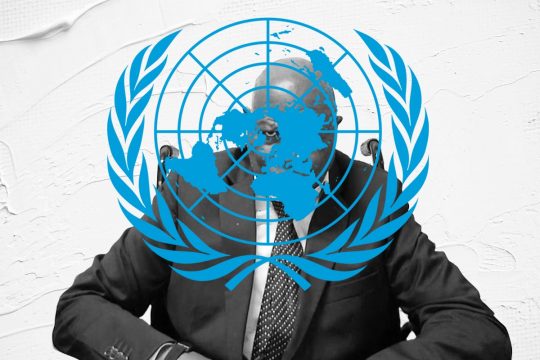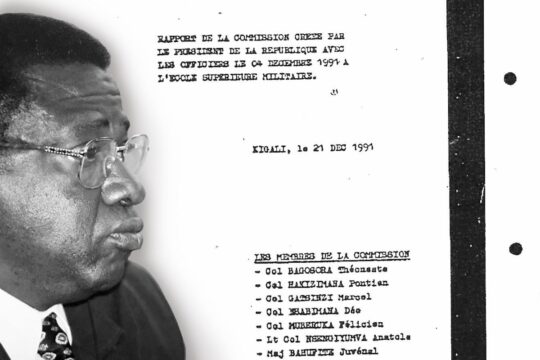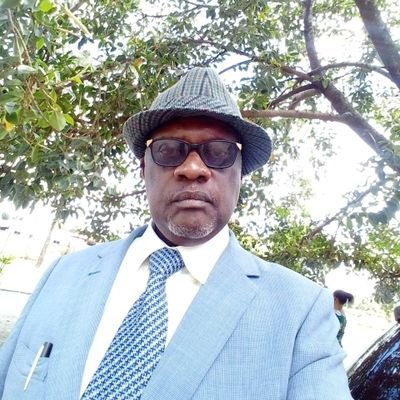"There is no other option than to declare Mr. Kabuga unfit to take part in his trial," said his lawyer Emmanuel Altit on Thursday, March 30. He was speaking at the end of these hearings of independent medical experts, called to comment on the health of Kabuga, who is accused in the last major trial on the 1994 Rwandan genocide.
Kabuga has been on trial since September 29 before the Dutch branch of the UN Mechanism that succeeded the International Criminal Tribunal for Rwanda. Charged with six counts of genocide, incitement to commit genocide and crimes against humanity, the former businessman is accused of funding the Interahamwe -- a militia that carried out attacks against civilians -- as well as Radio-Télévision Libre des Mille Collines (RTLM), a private radio station that called for murder during the massacres.
A "trial on the facts"?
According to Altit, who has been repeatedly recused by his client, Kabuga cannot interact with his defence team, and in his current state does not have the capacity to give instructions. Altit took issue with the prosecution's proposed "trial on the facts" option, under which proceedings could continue in the absence of the accused. "There would be no fair trial and justice would be only a semblance," said the defence lawyer.
Prosecutor Rupert Elderkin had just suggested that if Kabuga were declared unfit to participate in his trial, the proceedings could continue without him, since in criminal trials the task of defence falls to the lawyers. Presiding Judge Iain Bonomy corrected him, saying that would not be a trial on the facts but "a review of the facts to ensure that the detention of an incapacitated person is justified”. But even in this case, "how will the defence work if it cannot receive instructions from the accused?” asked Altit.
Altit reviewed the conclusions of the three independent medical experts appointed by the chamber, two psychiatrists - Irish professor Henry Kennedy and British professor Gillian Mezey - and a neurologist, Belgian professor Patrick Cras. Although their expert reports were kept confidential, it emerged from their hearings interspersed with closed sessions, questions from the chamber, prosecution and defence, that Kabuga suffers from “significant deficits in the following areas: short-term memory (acquisition and retention); episodic confusion, complex decision-making; attention and concentration, reasoning and judgment and executive functioning (i.e. doing tasks in the right order), expressive and receptive communication, as well as fluctuations in his mood and personality change”, according to the December 2022 expert report cited on the stand by defence attorney Dov Jacobs.
More like “severe” dementia
Professor Henry Kennedy, the first to be heard, said that Kabuga "did not complete many of the tasks we gave him" during his psychiatric examination. He said the former Rwandan businessman is suffering from a “progressive physical and mental decline that is likely not to improve”.
Kabuga is experiencing a progressive reduction in his cognitive abilities, is losing his memory, has a deficit in comprehension and expression, and is often confused. He has "dementia," he concluded.
Judge Ivo Nelson de Caires Batista Rosa wanted to know more about the degree of dementia of the accused. “Is it mild or moderate or severe? The categories allow me only to say mild or severe. I would prefer to choose moderate, but I’m obliged to choose more severe,” said the psychiatrist. His diagnosis is clear: Kabuga does not have the capacity to understand the evidence, and therefore cannot testify. According to Kennedy, "the process of testifying goes beyond the expression of will and preferences", as Kabuga may give answers without understanding the scope and purpose of the questions asked, especially on cross-examination. "The problem is Kabuga's capacity to understand the point of the cross-examination," the Irish expert said.
Judges and lawyers have asked whether "the old man", as Rwandans call him, is exaggerating and faking. “Any psychiatrist has always to consider the possibility that one can be deceived and that one has to be sensitive to that and has to look, therefore, for inconsistencies. In Mr. Kabuga's case, relying as much as we can on objective findings rather than subjective findings, we now find that a diagnosis of dementia can be made,” replied Professor Kennedy. “Taking the totality of the clinical information available to me, having interviewed him on three occasions and interviewed many other clinicians who were working with him continuously, I believe there is a real deterioration.”
At times, Kabuga does not know he is in prison
This diagnosis was confirmed by British expert Professor Gillian Mezey, who said that since May 2022 Kabuga has shown both physical and mental deterioration. The deterioration, especially mental, is progressive and irreversible. He is experiencing increased irritability, accompanied by fatigue, inability to stay awake, confusion and disorientation. She described how Kabuga could no longer recognize her, and even after introducing herself and explaining why she was there, ten minutes later he still asked her who she was and what she was doing there. She said that although Kabuga was indeed following this hearing from a distance, if he was asked what it was about when he left the hearing, he would not be able to remember.
Mezey explained that Kabuga cannot receive and retain complex information. He experiences continuous fatigue, so he "was falling asleep during the examination”. The British expert said that the level of dementia he has reached cannot allow him to have a deep conversation. When asked if Kabuga can make responsible choices, the professor said that if he were brought an apple and a banana he could make a choice, but on a more complex issue, even if he made a choice, it is not easy to determine his level of responsibility in that choice.
"Expressing a will and preference is not necessarily with full capacity," said the expert. As an example, the professor said she asked him if he preferred the trial to stop or continue. He said, "I am sick, I don't want the proceedings to continue", and when asked where he wanted to live in the future, he said, "where I am now”. At times, she said, he does not know he is in prison. According to the expert, Kabuga understands the charges and their consequences, but he cannot instruct his lawyer and discuss with him a line of defence, witness evaluation and so on.
"No reason to think that he is exaggerating or simulating"
"The more complex the information, the less he will understand and retain it," says the psychiatrist. Therefore he cannot testify. "Giving evidence requires memory ability and understanding of complex phrases" but "he is unable to communicate his opinions and views". The judges then asked him if the defendant could just watch the trial without participating. While Professor Kennedy said that would tire him unnecessarily, Professor Mezey said he would simply fall asleep after a few moments.
Belgian neurologist Patrick Cras agreed with the other experts. He told the judges that Kabuga has brain damage, his frontal cognitive functions have deteriorated, and that he has vascular dementia resulting in acute cognitive deterioration. He has functional disorders, attention disorders, slowed thinking, memory loss, lack of motivation, lack of insight. In other words, his dementia is "permanent and irreversible", the expert ruled. "I have no reason to think that he is exaggerating or simulating," he said, noting that tests have shown Kabuga suffers from both long and short-term memory deficits.
“In the light of our most recent assessments we are now confident in our opinion that Mr. Kabuga is not fit to participate meaningfully in his trial,” the three independent experts jointly concluded.
Despite their unanimity, the prosecution continued to challenge this conclusion. Prosecutor Elderkin, in his submissions, pointed to methodological problems, arguing that the results would have been different if they had not at times conducted their examinations by video conference. He said the language barrier that required the services of an interpreter would also have affected the results. He did not rule out that the most recent results could have been because of infections suffered by the accused shortly before their examinations, and that there could be improvement in the near future.
"Kabuga understands the charges and the consequences thereof. If he is duly represented, he can stand trial," said the prosecution representative, who suggested that "alternatively, the chamber could proceed with the examination of the facts" without the accused.
The judges are deliberating on the matter, and could deliver a decision at any moment.
THE CAMBODIAN PRECEDENT
If Félicien Kabuga is declared unfit to stand trial, he would not be the first in the history of international justice. In 2011 Ieng Thirith, former Social Affairs Minister in the Khmer Rouge government of Cambodia, was deemed unfit to stand trial for neurological reasons (Alzheimer's disease). After an attempt at medical treatment, she was finally released in September 2012 since the court found that "Ieng Thirith's long and short-term memory loss would prevent her from understanding the trial process sufficiently to instruct her lawyers and effectively participate in her defence", and that there was “no reasonable prospect that the accused would regain the cognitive functions that would make her fit to stand trial in the foreseeable future". She died three years later.








